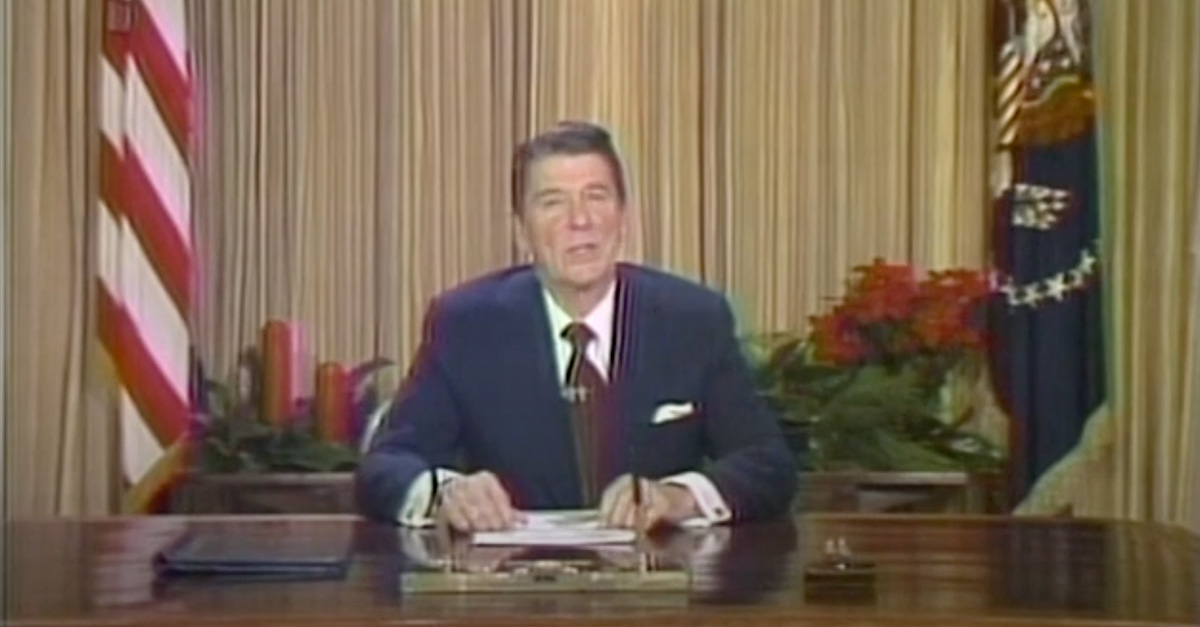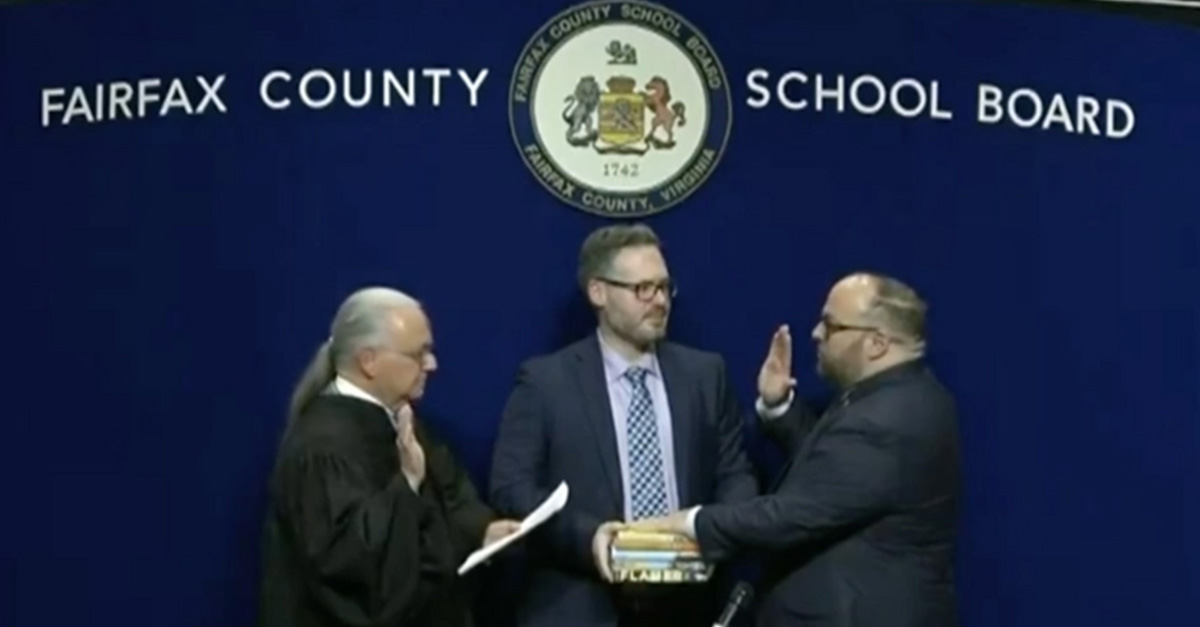


Get a free copy of Parental Rights & Education when you subscribe to our newsletter!

Speaking during a time when the Polish people were being crushed by the communist boot, Reagan reminded them — and us today — that even in a time of evil, there is a shining beacon of hope that breaks through the darkness. And that bright hope is found in the newborn babe lying in a manger.
In his 1981 Christmas address, Ronald Reagan, the 40th President of the United States, delivered a powerful message that still resonates with many today, especially those who find themselves in oppressive circumstances.
In his speech, Reagan said, “Some celebrate Christmas as the birthday of a great and good philosopher and teacher. Others of us believe in the divinity of the child born in Bethlehem, that he was and is the promised Prince of Peace. Yes, we’ve questioned why he who could perform miracles chose to come among us as a helpless babe, but maybe that was his first miracle, his first great lesson that we should learn to care for one another.”
While President Reagan was ecumenical and diplomatic in his address, he didn’t shy away from emphasizing the true meaning of Christmas: Jesus Christ, God the Son, born in human flesh to live, die, and rise again on behalf of all those who repent of their sins and place their faith in Him.
For it is only through the “divinity of the child born in Bethlehem” that Christ could be the “promised Prince of Peace.”
In the arrival of the Prince of Peace, we have a great promise of deliverance, both from our earthly suffering and the weight of sin. On a cold winter night halfway around the world, this statement held particular power and hope for the Polish people, who had just been put under martial law.
When Reagan gave this address, it was during the pitched fight of the Cold War between the communist Soviet Union and the free West. Later in his address, Reagan specifically encouraged the Polish people. He notes, “As I speak to you tonight, the fate of a proud and ancient nation hangs in the balance. For a thousand years, Christmas has been celebrated in Poland, a land of deep religious faith, but this Christmas brings little joy to the courageous Polish people. They have been betrayed by their government.”
At that time, the Polish people were suffering under a communist regime that was largely controlled by the Soviet Union. The event of December 1981 that Reagan was talking about was the imposition of martial law as a way to crack down on the Solidarity civil resistance movement. The Soviet puppet government sent tanks into the streets, outlawed nearly all public gatherings, set curfews, ramped up censorship, and jailed hundreds of members of Solidarity, including its leader Lech Walesa, all to “avert anarchy.” Martial law would last until July 1983.
Thus, Reagan was “deeply concerned” about the situation in Poland and said that he had “a special message” for the Polish people. He urged them to “hold fast to their faith in God and in themselves” and to “never give up hope.” He also praised their courage and resilience, saying that they had “demonstrated once again that freedom is not a gift, but a right.” He ended his speech by saying that he was “praying for you and your loved ones” and that he hoped that “God will bless you and keep you safe.”
As Reagan rightly pointed out, their historical Christian faith provided the Polish people with a beacon of hope amidst the darkness of their circumstances. The birth of Christ is, of course, first and foremost about our deliverance from sin and Satan’s power, but it is also a symbol of resistance, of the fight between good and evil, and the possibility of freedom from darkness.
No, the birth of Christ is not a “take it to bank” promise of deliverance from evil in this life — those who interpret it like that go the way of social justice warriors and liberation theologians.
Still, as conservative Christians, we can rightly say that Reagan is not wrong to hold the most critical event in human history, the birth of Christ at Christmas, as a shining beacon of hope in the fight against would-be totalitarians and human oppressors.
For the Christians suffering under the communist boot in Poland in 1981, Christmas was a sign that God will come — has come — to overthrow the forces of evil in this world. Christmas brings a promise of hope and deliverance because Christmas brings a promise of judgment. When the curse is reversed, and when Christ comes again as a conquering King, no one will escape His wrath — except for those who have claimed Him as Lord.
Reagan’s quote also touches on the paradox of God choosing to enter the world as a “helpless babe.” This act, which he suggests might be Christ’s “first miracle,” is a powerful lesson in humility. It teaches us that to truly care for one another, we must first understand vulnerability. By coming into the world as a helpless child, Christ demonstrated the importance of entering into each other’s weaknesses and the strength inherent in vulnerability.
This lesson was particularly relevant to the Polish people. Their shared vulnerability under totalitarian rule could have been a source of division. Instead, it became a source of unity, a testament to their resilience. Their shared faith became a wellspring of hope, a light that pierced the darkness of their circumstances.
Like the Polish people in 1981, many Americans today feel like they are under a hostile regime in their own country, the regime of wokeness, Diversity, Equity, and Inclusion (DEI), and neo-Marxism. And the cultural revolution, with all of its chaos, destruction, and degradation, shows no sign of slowing down.
Where can American Christians find hope? In the same manger that the Polish people looked to over 40 years ago, the one where Christ the Lord could be found.
Christmas is a celebration of light breaking through the darkness: “In him was life, and that life was the light of all mankind. The light shines in the darkness, and the darkness has not overcome it” (John 1:4-5). It is a reminder that even in the bleakest of circumstances, hope persists. The birth of Christ is a testament to the enduring power of God to bring peace on earth and goodwill to men.
Reagan’s 1981 Christmas address serves as a timeless reminder of these values. His words continue to resonate, offering hope and inspiration to those who find themselves in oppressive circumstances, including Americans in the woke, increasingly totalitarian mess of a world we find ourselves today.
Thankfully for the Polish people, less than eight years after this speech, and six months after Reagan left office, candidates from the Solidarity Movement swept to a resounding victory in the parliamentary elections, and in 1990, Lech Walesa was elected president. Poland was finally free of communist rule.
So, yes, tyranny may last for a night, almost a decade, or even longer. But joy and deliverance will come in the morning. Christmas morning guarantees it.
The Church must be involved in public discourse and influence. That’s why we write — so our readers can be equipped to understand and pursue righteous change in the world. For more timely, informative, and faith-based content, subscribe to the Standing for Freedom Center newsletter.
Christian conservative news and issues that matter. Curated just for you!
